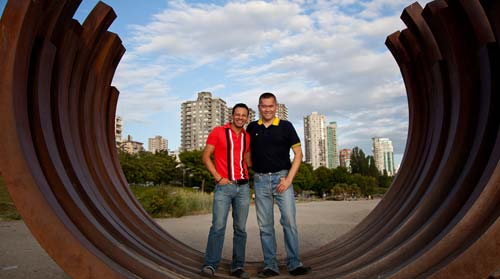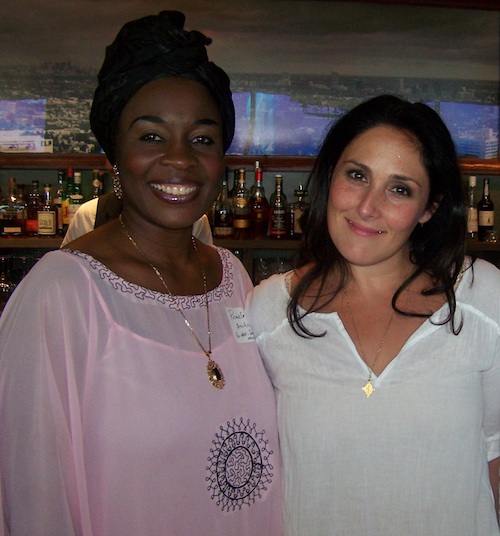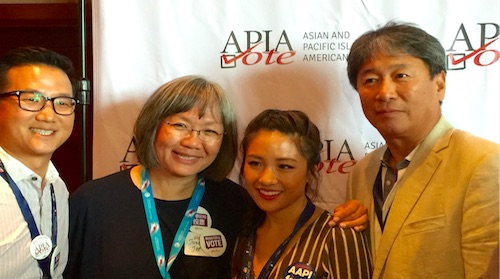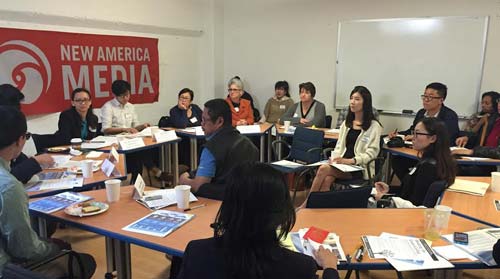New America Media, Op-ed,
Every year on Dr. Seuss’ birthday, my partner Richi dons an impeccable Cat in the Hat outfit he made himself and drives 40 miles to work, the same drive he makes every school day. He could work closer to home, but the kids in the impoverished Hispanic neighborhoods where he has taught for 10 years need him, and their responses to his innovative teaching prove that. He spends extra hours tutoring those most in need, and he sheds happy tears when his students excel on exams. More than just a school hero, he’s also a community hero. When Hurricane Katrina hit Louisiana and Mississippi, he purchased groceries with his own money and delivered them to families arriving at lonely Houston motels, and he was a regular Astrodome volunteer.
Richi’s heart is as big as any American’s, but he’s Colombian, and his path to American legal permanent resident was interminable. He complied with all laws and always maintained legal status, but he endured more than 15 years of waiting, thousands of dollars in legal and filing fees and out-of-state tuition, and intimidating encounters with U.S. Customs and Immigration officers, consulates, and police. Yet he was lucky; he received his green card. Many like him, and their life partners, were not so fortunate.
Richi and I are a same-sex binational couple, one of more than 36,000, according to the 2000 Census. Though the historic basis of U.S. immigration laws is family unification, U.S. citizens could not sponsor foreign same-sex partners for green cards, regardless of how long we had been together or if we were legally married. If American laws had been fair, I could have sponsored Richi for residence when we met in 1996, and he would have become a citizen before the millennium’s end. He embodies the character that Americans honor and value, but the unfairness of our laws let us and thousands like us down.
Our relationship drew me to immigration law and activism. I’m also biracial and binational, born in Seoul to a Korean mother who was born in China and a European American father who grew up in Mexico. I’m also gay and have worked most of my career as a lawyer, adjunct law professor, and activist on LGBT and HIV issues. The immigration connection came naturally. I co-chaired the board of America’s preeminent LGBT/HIV immigration law organization, the Lesbian and Gay Immigration Rights Task Force, and we changed the name to Immigration Equality, because those two words perfectly stated what we were fighting to achieve.
For much of my career, I have assisted binational same-sex couples who sought alternative and legal ways to remain together, often through a temporary status that required the holder to return to his or her home country. Those who could not qualify or pay for lawyers often felt compelled to “go illegal” or leave the U.S. for countries that recognized their relationship. Many couples could not survive the immense pressures. Forced exiles and breakups have had huge subsidiary effects, since many couples raised children and maintained close relationships to other relatives left behind. Despite efforts to pass legislation that would partly correct the injustice and end the suffering of many couples, and the recognition of marriage in a growing number of states, the constitutionally offensive Defense of Marriage Act (DOMA), which defined marriage for federal law purposes as “only a legal union between one man and one woman as husband and wife,” stood ominously in the way.
Of all the 1000+ federal benefits withheld from same-sex couples because of DOMA, none hit more personally than the inability of U.S. citizens to confer immigration benefits on those they love. But on June 26, 2013, the monumental decision Windsor vs. U.S. sent the most vile section of DOMA into history’s cesspool, with Jim Crow Laws, poll taxes, miscegenation laws, and other shameful remnants of discrimination we now wish never existed. The decision did not move me as much as did Department of Homeland Security Secretary Janet Napolitano’s words a few days later: “Effective immediately, I have directed U.S. Citizenship and Immigration Services (USCIS) to review immigration visa petitions filed on behalf of a same-sex spouse in the same manner as those filed on behalf of an opposite-sex spouse.” Immigration equality at last!
Yet crucial battles remain. Hundreds of thousands of LGBT individuals and families are part of the millions negatively impacted by America’s lack of common-sense immigration reform. Many must battle from both the immigrants-without-rights and LGBT closets. The battle for comprehensive immigration reform must be part of the LGBT agenda; countless undocumented or out-of-status LGBT people are part of a larger group that continues to be treated as subhuman. Those who call human beings “illegal” should remember that at one time, that dehumanizing word described escaped slaves, women voters, biracial couples, gays and lesbians. But when we realized how wrong we were, the laws changed, and what was once illegal became legal. The same will happen in the way we treat our immigrants.
Laws can’t temper and borders can’t restrain true love. Americans should be appalled that we did not allow all our citizens to sponsor law-abiding life partners for residence. Despite my many imperfections, I was blessed to find someone who makes me perfectly happy, and I resent that my country made us fear that Richi might not be allowed to stay with me. I am angry that so many other couples were not able to leave the hellish maze we should never have had to enter. But I am confident that the huge recent victory for same-sex binational couples will move us farther towards comprehensive, compassionate, and respectful changes in our nation’s immigration laws.
John Nechman practices immigration law and is a partner in the law firm Katine & Nechman L.L.P. and is an adjunct professor at South Texas College of Law in Houston.
This column is part of New America Media’s series “Coming Out for Immigration Reform,” written by LGBT rights activists and sponsored by the Four Freedoms Fund.










